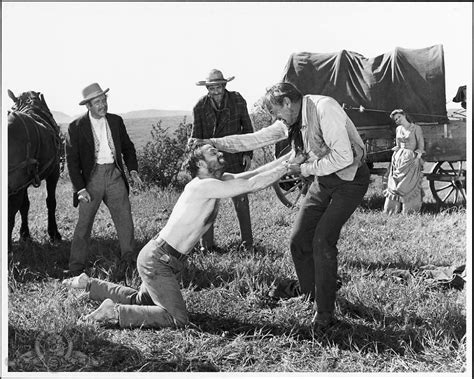Man of the West - 1958
 Tuesday, March 21, 2023 at 04:34PM
Tuesday, March 21, 2023 at 04:34PM At this point, director Anthony Mann apparently had no more fucks to give re: Western tropes, stories, themes or outcomes. He cared only about his obsessions and obsessing over them. Joining him in negative-fucksland is Gary Cooper, playing the least heroic, most embittered hero of his career.
Welcome to Mann's most displaced picture- the one in which ostensive narrative content has the least possible connection to what's really happening onscreen. Given that Mann has long been the champion of emphasizing subtext over text, this one is truly out there.

F'rinstance, Cooper beats the living shit outta Jack Lord, in vengeance for coming onto Julie London - wtf is Julie London doing here? - in a ferocious, yes obsessive, grapple. When Lord is a bloody pulp, Cooper, shouting all the while, makes Lord his punk by tearing off all his clothes, one obsessive item at a time. We don't find out what Cooper intends to do with naked Lord because scenery-devourer Lee J. Cobb shoots Lord - his son.
Quite arresting Mann tracking shots appear now and then to remind viewers of the day they're not home watching the TV, but are in fact in a movie theatre admiring big-ass, widescreen Cinemascope. Otherwise, Mann vests in Boetticher epic exteriors and what would become Leone mega-hella-closeups.
Much unbearable overacting in the Mann mode, but savoring and attempting to suss what each scene is really about will keep you glued to the screen.
With a trail of bodies - all of relatives or adopted relatives - to his credit, Cooper and London ride off into the sunset. But wait! Cooper has told the besotted London he has a wife and kids back in whatever Western shithole his embittered ass traveled forth from.
London takes his hand, tells him she never felt love this like this - consummated with not even a kiss, mind you - and that, even though she can never have him, that love is perfect and all she needs.
And that's the end/climax of the picture!
So, Mann's telling you that all cowboy movie violence is the manifestation of unaddressed or brutally, punitively suppressed queer desire. I mean, who can argue? But fuck Douglas Sirk and all his subtle implications. Mann makes it plain as plain...
 Anthony Mann,
Anthony Mann,  Boetticher,
Boetticher,  Douglas Sirk,
Douglas Sirk,  Gary Cooper,
Gary Cooper,  Lee J. Cobb
Lee J. Cobb 

